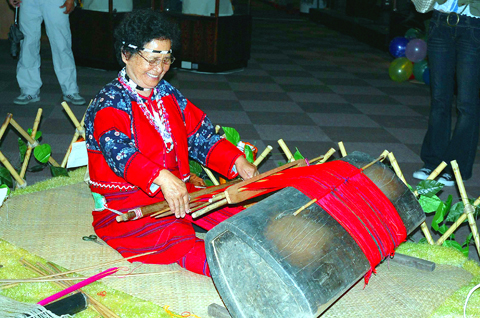A group of Aboriginal people who reside mainly in the border area between Hualien and Nantou counties were recognized yesterday as the Sediq, the country’s 14th distinct indigenous group.
At its regular weekly meeting, the Cabinet approved a proposal by the Council of Indigenous People to classify the Sediq as a separate group from the Atayal tribe.
Premier Chang Chun-hsiung (張俊雄) said that the approval was based on the spirit of “respecting the will of native people” and in accordance with the principle of “equality” enshrined in laws and regulations to guide the government’s Aboriginal policies.

PHOTO: CNA
“On behalf of the government, I hereby send my sincerest congratulations to the Sediq people on the restoration of their own tribe name,” Chang said.
Minister of the Council of Indigenous People Icyang Parod said the move would help the Sediq to “raise their self-identification and safeguard the tribe’s cultural heritage.”
The Sediq will have their own representatives on the council’s highest policy-making commission, Icyang said.
The council said there are about 6,000 to 7,000 Sediq.
The Japanese colonial government arbitrarily lumped together Aboriginal groups into “nine tribes” during its occupation of Taiwan, under which Taroko, Sediq and other groups were labeled as Sediq, a subgroup of the Atayal tribe.
The classification system was not challenged until the Democratic Progressive Party government came to power in 2000. It recognized the Tsao as the 10th tribe in 2001, followed by the recognition of the Kavalan, Taroko and the Sakizaya.
Ever since the recognition of the Taroko in January 2004, several negotiations had been held on whether the Sediq would agree to also use the name Taroko. But the discussions proved fruitless, as “both groups had been inconsistent on their specific names,” Icyang said.
The Sediq tribe filed an application with the council for recognition in April 2006.
The Cabinet decided to approve the recognition of the Sediq after a review committee under the direction of Minister-without-Portfolio Liu Yu-shan (劉玉山) concluded that the Sediq’s demand should be respected in accordance with the UN Declaration of Aboriginal Rights, Article 10 of the amendment to the Constitution and the Aboriginal Basic Law (原住民族基本法).
Wantan Diro, executive director of the Sediq Tribe Name Restoration Association, was excited yesterday by the Cabinet’s decision.
“Hallelujah! Thank God!” Watan said when asked by the Taipei Times for comment by telephone.
“I would like to thank Premier Chang for his decisiveness, the Council of Indigenous Peoples, the seven Aboriginal legislators and all the media organizations that have reported on our efforts [to gain recognition],” he said.
Wantan said that official recognition is not the end, but the beginning of another page in the tribe’s history.
“We will need to start organizing our tribal assembly, preparing for autonomy, building a tribal identity, and most importantly — revive, preserve and reform the Sediq language, culture, customs, sciences and education,” he said.
Wantan said that though several tribes have received official recognition in recent years, their people still do not feel attached to their new tribal identity.
“So we’re planning on a campaign with the goal to get at least 10,000 Sediqs to register themselves as Sediqs with the Household Registration Offices,” he said.
As for culture, Watan believed that, in addition to reviving and preserving the wisdom of the tribe’s ancestors, “we need to also reform some of it according to new technical or scientific developments and findings, so that our ancient knowledge won’t become outdated.”

The Mainland Affairs Council (MAC) today condemned the Chinese Communist Party (CCP) after the Czech officials confirmed that Chinese agents had surveilled Vice President Hsiao Bi-khim (蕭美琴) during her visit to Prague in March last year. Czech Military Intelligence director Petr Bartovsky yesterday said that Chinese operatives had attempted to create the conditions to carry out a demonstrative incident involving Hsiao, going as far as to plan a collision with her car. Hsiao was vice president-elect at the time. The MAC said that it has requested an explanation and demanded a public apology from Beijing. The CCP has repeatedly ignored the desires

Many Chinese spouses required to submit proof of having renounced their Chinese household registration have either completed the process or provided affidavits ahead of the June 30 deadline, the Mainland Affairs Council (MAC) said on Thursday. Of the 12,146 people required to submit the proof, 5,534 had done so as of Wednesday, MAC deputy head and spokesperson Liang Wen-chieh (梁文傑) said. Another 2,572 people who met conditions for exemption or deferral from submitting proof of deregistration — such as those with serious illnesses or injuries — have submitted affidavits instead, he said. “As long as individuals are willing to cooperate with the legal

The Ma-anshan Nuclear Power Plant’s license has expired and it cannot simply be restarted, the Executive Yuan said today, ahead of national debates on the nuclear power referendum. The No. 2 reactor at the Ma-anshan Nuclear Power Plant in Pingtung County was disconnected from the nation’s power grid and completely shut down on May 17, the day its license expired. The government would prioritize people’s safety and conduct necessary evaluations and checks if there is a need to extend the service life of the reactor, Executive Yuan spokeswoman Michelle Lee (李慧芝) told a news conference. Lee said that the referendum would read: “Do

Taiwan's Vice President Hsiao Bi-khim (蕭美琴) said Saturday that she would not be intimidated by the Chinese Communist Party (CCP), following reports that Chinese agents planned to ram her car during a visit to the Czech Republic last year. "I had a great visit to Prague & thank the Czech authorities for their hospitality & ensuring my safety," Hsiao said on social media platform X. "The CCP's unlawful activities will NOT intimidate me from voicing Taiwan's interests in the international community," she wrote. Hsiao visited the Czech Republic on March 18 last year as vice president-elect and met with Czech Senate leadership, including